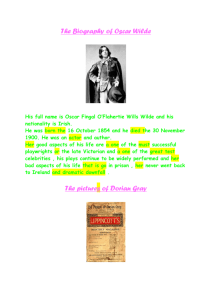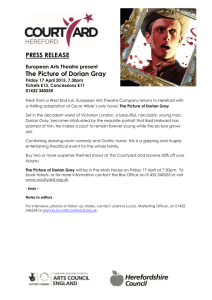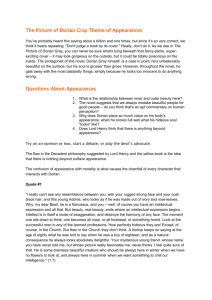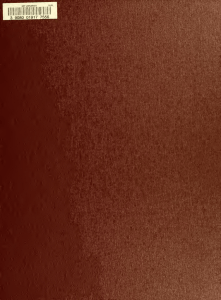Dorian Gray keycards
advertisement
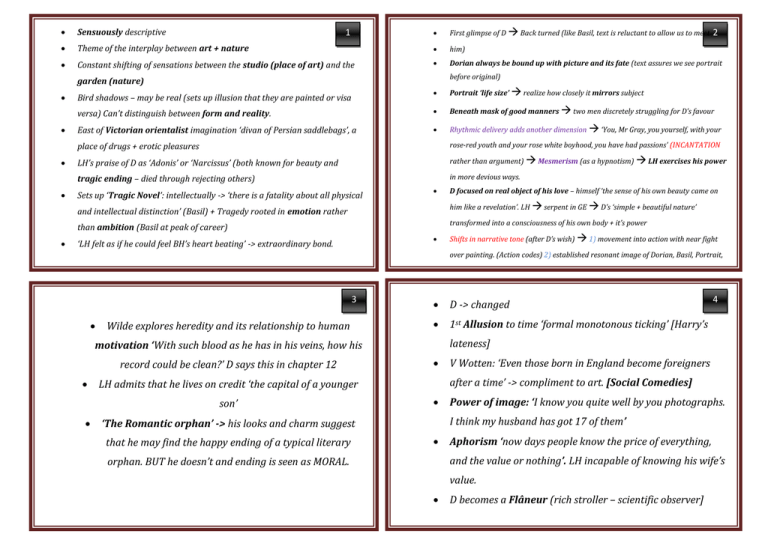
First glimpse of D Back turned (like Basil, text is reluctant to allow us to meet Theme of the interplay between art + nature him) Constant shifting of sensations between the studio (place of art) and the Dorian always be bound up with picture and its fate (text assures we see portrait Sensuously descriptive 1 before original) garden (nature) Portrait ‘life size’ realize how closely it mirrors subject versa) Can’t distinguish between form and reality. Beneath mask of good manners two men discretely struggling for D’s favour East of Victorian orientalist imagination ‘divan of Persian saddlebags’, a Rhythmic delivery adds another dimension ‘You, Mr Gray, you yourself, with your Bird shadows – may be real (sets up illusion that they are painted or visa place of drugs + erotic pleasures rose-red youth and your rose white boyhood, you have had passions’ (INCANTATION LH’s praise of D as ‘Adonis’ or ‘Narcissus’ (both known for beauty and rather than argument) Mesmerism (as a hypnotism) LH exercises his power tragic ending – died through rejecting others) in more devious ways. Sets up ‘Tragic Novel’: intellectually -> ‘there is a fatality about all physical D focused on real object of his love – himself ‘the sense of his own beauty came on him like a revelation’. LH serpent in GE D’s ‘simple + beautiful nature’ and intellectual distinction’ (Basil) + Tragedy rooted in emotion rather transformed into a consciousness of his own body + it’s power than ambition (Basil at peak of career) 2 ‘LH felt as if he could feel BH’s heart beating’ -> extraordinary bond. Shifts in narrative tone (after D’s wish) 1) movement into action with near fight over painting. (Action codes) 2) established resonant image of Dorian, Basil, Portrait, Knife (recurring) 3) Dispute over what consists ‘real’ D. 3 Wilde explores heredity and its relationship to human B knows he has lost D to LH ‘at least you are like it in appearance’ D -> changed 1st Allusion to time ‘formal monotonous ticking’ [Harry’s lateness] motivation ‘With such blood as he has in his veins, how his record could be clean?’ D says this in chapter 12 Power of image: ‘I know you quite well by you photographs. I think my husband has got 17 of them’ ‘The Romantic orphan’ -> his looks and charm suggest that he may find the happy ending of a typical literary V Wotten: ‘Even those born in England become foreigners after a time’ -> compliment to art. [Social Comedies] LH admits that he lives on credit ‘the capital of a younger son’ 4 Aphorism ‘now days people know the price of everything, and the value or nothing’. LH incapable of knowing his wife’s orphan. BUT he doesn’t and ending is seen as MORAL. value. D becomes a Flâneur (rich stroller – scientific observer] 5 • • I Have had the arms of Rosalind about me, and Ironically even though JV dislikes the theatre, he is a standard Kissed Juliette on the mouth. May UNCONCIOUSLLY character of melodrama, a heroic representative of the working class chosen female counterpart of himself own set against a corrupt aristocracy identity blurring + echoes aspects of his friends. Sense of foreboding deepened -> Mrs Vane’s children are illegitimate. Basil’s lonely journey in hansom. Represents the Real emotional price Sybil would pay if D were to betray her. • split. LH – B 1:nil. ‘Sense of loss’ Mrs Vane finds new a melodramatic cliché to perform of ‘desolate’ Dorian’s account of kiss ‘rose coloured joy’ reflects mother saying farewell to her child makes clear that Sibyl will find no LH’s to Dorian as a ‘rose’ in chapter 2. emotional support (if it happens). ‘The man who could wrong her would be a beast, a beast without a heart’ • • Doctrine of separate spheres -> women provide constancy in D’s provided with consumer luxuries. Those who work for a living -> absent or too discreet to question his priorities. home. Sibyl not. • Actress: ‘tragic figure, torn between domesticity and a career’ • ‘Love is a more wonderful thing than Art’ (BUT IS IT MORE IMPORTANT) Basil – artist’s account. • • Adherents to ‘Doctrine of Separate Spheres’ ‘women love being dominated’ • Sibyl to be spiritual guardian of his home… role imposed on women by conservative Relationship between art + reality = complex. Dorian can’t tell difference. • Plato’s theory of forms -> Sibyl adopts beliefs • Art is a copy ‘I suppose they don’t know your name at the theatre? If they don’t, it is alright.’ considers aristocracy to be above Law. Kerry Powell • Barbed Satire: Victorian attitudes of class + gender. Morning after watching Sibyl. opponents of female emancipation • Dark Irony, ‘Sibyl’ as ‘selfish’ • ‘Cry out against heaven because the daughter of Brabantio died, but don’t waste your tears over Sibyl Vane’ • Balances previous chapter (LH convinces D not to regret S’s death) • Same symmetry occurs in treatment of Faust story (Man who sold soul visited by both Good and Bad angels) • Speech reminiscent of LH ‘There is a son, a charming fellow, I believe’ (unlike anything heard from him so far) • Basil’s desire apparent, but less overt. • No human being will compete with the painting’ • BASIL: (D’s painting not costumed as mythological or historical figure but as himself. RATHER than destroying him (Sibyl) reality has entered + transformed 9 his art) • Dorian provokes others to explore relationship between art + reality + shadow and substance (Ironically, something he can not grasp) • Is perpetual youth going to enlarge D’s experience but leave him with emotional equipment of damaged child : child dressing up as LH. Childless afraid of hearing Sibyl’s inquest. ‘I am a man now’. ‘He calls Sibyl ‘shallow and stupid’. • ALSO earlier on: Sibyl ‘gave shape and substance to the shadows of art’ • Sibyl + Basil’s views on art different. He’s not destroyed by bringing in reality. • In lit, upper room symbolize aspect of psyche of which everyday self is unaware In Gothic lit room usually harbours secret invoicing violence or disgrace ‘School room’ built ‘specially’ for D Kelso saw D as a shameful secret. D treats ‘real D’ in same way (IRONIC) Wilde offers PSYCHOLOGICAL basis for D’s behaviour (Lonely unwanted child becomes self obsessed -> no opinions at beginning + theme of isolation) Isolation aspect of Faustian Bargain (ageless, cut off from people who grow old + die) D’s response to S’s ‘inquest’ (thinks of himself in 3rd person isolated. ‘What had Dorian Gray to do with Sibyl Vane’s death’ Inability to connect with ‘HORRIBLY REAL’ echoes growing isolation like Faustus in Marlow’s play . Mephistopheles provides Faustus with entertainment LH Provides D with ‘Yellow Book’ Victor: object of paranoia ‘impassive’ later has ‘treacherous eyes’, end he is a ‘spy’ blackmailer’s charter • • • • • • • • Dorian MAY ONLY imagine living the life of Nero (who had Christians torn apart by wild beasts) or Caligula (committed incest + murder) + notorious Pope (consumed the blood of young boys) • Night before + Day of Dorian’s 38th Birthday • Dorian discovers a new sin: uses portrait in order to make Basil suffer -> texts links to ‘madness of pride’ (considered by church to be worst of all sins -> root of every other sin) 12 • Betrays a working women (Sibyl) + an aristocrat (Harry’s sister) • Lord Gloucester was one of my greatest friends at Oxford. He showed me a letter that his wife had written to him when she was dying alone in her villa at Mentone. Your name was implicated in the most terrible confession I ever read. I told him that it was absurd—that I knew you thoroughly, and that you were incapable of anything of the kind. Know you? I wonder do I know you? Before I could answer that, I should have to see your soul.” • Basil becomes abjected • Dead, Basil is a ‘thing…a dreadful wax image’ • Name Basil means ONLY something to him in a story sense ‘Paris! Yes. It was to Paris that Basil had gone, and by the midnight train, as he had intended’. Phrasing in pluperfect tense makes statement sound as matter of fact -> as if D believes his constructed Alibi. With such blood as he has in his veins, how could his record be clean? ‘ talking about BERWICK but reveals HUMAN motivation • Same kind of symmetry in chapter 2 and 4 (playing ‘Forest Scenes’- • pastoral innocence and then reading Manon Lescaut’ -> risqué lit). ‘-> Dorian posed to echo + contrast with his previous image. • Lies peacefully asleep as he does start of chapter 8 following betrayal of Sibyl. Values art over love -> choosing to follow LH (again as in chapter 8) • • Tension between comedy and Dorian’s rising terror (Pater valued) • ‘Terrible pleasure of a double life’ suggests Murder has depended his narcissism. • Women conform to custom and withdraw after dinner (subject to petty restrictions that D & LH would never have to face) Feminist reading. • Once again clock strikes: Midnight suggests that time is running out for Dorian Wilde shows damage to Dorian’s psyche. Literary Allusion -> where images of poetry reflect his inner landscape (hand of a murderer) • • Ticking clock motif returns: ‘dividing Time into separate atoms of agony’ • Imagery - > saturated with biblical Phrases and ideas ‘innocent blood’ and 16 ‘atonement’ • Gothic landscape -> (Darkness cut by flames) D’s journey into a physical hell. Pavement slime -> ‘like a wet mackintosh’ • D identified with Lucifer ‘that high spirit, that morning-star of evil’ • Urban hell -> many reminders of D’s victims: • Adrian Singleton: yellow hair makes him a distorting mirror of D – evokes D’s pity • Banter typical of social comedies. • Snap and speed indicate form of flirtation. • Difficult for couple to speak aloud exchanges without looking straight into each other’s eyes ‘I am on the side of the Trojans. They fought for a Women.’ … ‘They were defeated’ • Cues for compliments at regular intervals. Duchess’ mention of hat. • ‘We women love with our ears’ -> compliment to LH’s wit (possibly to make D jel) • Aphorism ‘Art has no influence on action’ -> LH has learned nothing about D • D’s comparison to Hetty as ‘Perdita’ ascoiates her with Sibyl. Hetty -> ‘was not one of our own class, of course’ D is recycling his ‘Prince Charming’ role without any sense of irony. BUT ‘one’s days were still to brief to take the burden of another’s errors’ (Coming from a man who can never grow old… ) • Man wearing an ulster -> coat favoured by Basil • Sibyl Vane’s mirror: It’s nigh on eighteen years since Prince Charming made me what I am. (suggests Sibyl’s awaited fate if lived) • Pseudonym -> ‘Prince Charming’ chosen for his drug adventures = insensitive. Suggests part of pleasure lies in contrast between his own body and the ruin of others. • First scene of novel Summer. • Narrative drawing to close Winter. • D’s compassion for hunted things springs from fact that he is one of them. • D’s reflections have a metafictional element ‘the good end happily, the bad unhappily: that is what fiction means’ (whereas in real life criminals get away with their crimes) • Outcome of his life is fiction? • ‘The mask of youth had saved him’ as if mask were an identity like ‘prince charming’ (chooses to resume rather than supernatural) • The division between real and fictional is eroding the differentiation between art and reality too • Allusion: reference to Macbeth (who has to go on killing in order to survive and is tormented by a ghost of one of his victims). Dorian haunted by JV + murder Basil becomes ‘his friend’ rather than ‘the thing’ • Final tableau (D drawing a veil to reveal a hidden face – reminder of D drawing curtain away from portrait becomes a reminder) 20 • End of the Devil’s bargain – where Devil comes to claim his own. • Anti epiphany – D has lost the ability to distinguish right from wrong • • • Prose Narrative • Developed social comedy • The well-made play: exposition, development and complication, crisis, denouement and soul from body + form and reality. • Structure fits closely with Faustus story D’s selfhood broken down to corruption to a point where his servants • The detective story (who dress, feed + care for him) can not identify his body. • James vane brings stands of story together providing modern version of gothic haunting and suspense of revenge plot Rings symbol of rank and wealth (further symbolic of only thing he • has gained from his bargain) Tableux: Dorian at piano, young and innocent and again playing Chopin to LH in very different spirit. D sweetly sleeping after terrible acts • Eponymous hero • Ekphratic
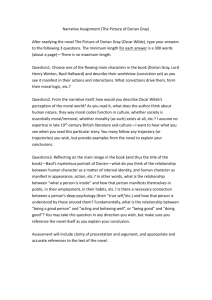
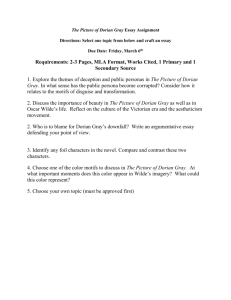
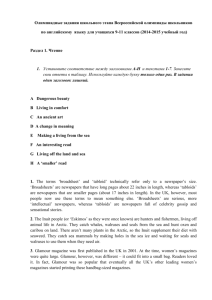
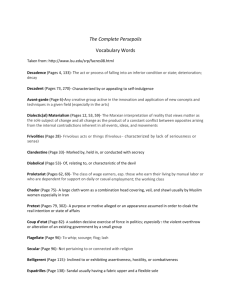
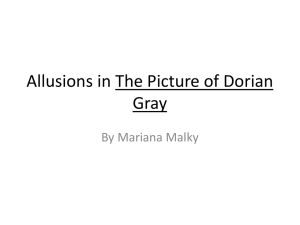
![1] “We are all in the gutter, but some of us are looking at stars.”](http://s3.studylib.net/store/data/008020677_1-75cd0ecbfa322a6e05ad8c790bb806f6-300x300.png)
